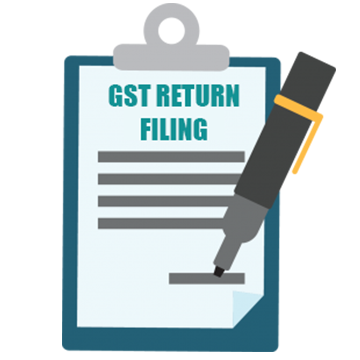GST Returns
Prices Starting from INR 499/- only.
Timeline – 1 Working day
(No Hidden Cost)

Goods and Services Tax (GST) is applicable in India since 1 July 2017. In the new GST rule, approximately 1.4 Cr companies/businesses in India have obtained Goods and Services Tax (GST) registration. All companies who have registered for GST are essential to file Goods and Service Tax (GST) returns monthly. GST return filing is essential for companies having GST registration, regardless of business activity or sales or profitability in the return filing period. Therefore, even a latent business that obtained GST registration is essential to file a GST return.
Goods and Service Tax (GST) law now plays a key part of the indirect tax system in India. The merchants registered under this rule need to file the compliance regularly. Based on the business turnover and the activities, the period of filing returns is set under GST law. Through online Goods and Services Tax (GST) return filing, the taxpayers intimate the Goods and Service Tax Network (GSTN) about the inflow and outflow of supplies containing the sum of tax collected and paid. Whereas record the taxable transactions with Government, the taxpayer similarly needs to pay the sum of tax collected from an outward supplier of goods/services after the deduction of Input Tax Credit (ITC).
File monthly Goods and Services Tax (GST) returns and keep your GST compliance with Auditor support. Upload your monthly invoices or documents on our website, that’s all you need to do rest our Account team will take care and file your returns. Goods and Service Tax (GST) return is a documentation of all the Sales particulars, Input tax credit and Output tax liability. Filing these GST Returns needs tax liability payments to the government by the taxpayers.
As per the Goods and Services Tax (GST) law, all Individual/Company/LLP registered under the Goods and Services (GST) Act has to provide the particulars of sales, purchases and the tax paid by filing for Goods and Services Tax (GST) returns with the government authorities.
As a business individual/firm, one of your primary priorities will be to file GST return. Hence, knowing the support who can assist you make the compliance process simpler and smoother. Whereas filing a Goods and Service Tax (GST) return, you are supposed to provide all the details associated with your business activities, like the tax payments, tax liability declarations and also any other related data as per orders provided by the government.
The Goods and Services Tax (GST) return filing procedure has to be done on in the GST portal. A facility has to be accessible for the manual procedure of GST return filing, this facility helps the business taxpayer to prepare the return offline then upload the details on GSTN through the facilitation center. There are also many components of Goods and Services Tax (GST) returns filing that you are essential to know.
The Goods and Services Tax (GST) return primarily contains procurements, input tax credits as per GST paid while purchases, output GST on the sales and also comprises the overall sales. In order to file the Goods and Services Tax (GST) return, the purchase invoices and GST compliant sales are required.
Goods and Services Tax (GST) return filing is entirely an online process in India. GST return online filing is very easy and rapid process. Though, it is essential that returns are filed appropriately and error-free to guarantee that Goods and Services Tax (GST) credit can be approved onto the next phase. All you require is GST Portal login credentials to get started. When your Goods and Service Tax (GST) registration is done, GST return filing is compulsory. Non-filing of the same involve heavy penalties
Goods and Service Tax (GST) registered individual/companies are essential to file GSTR-3B return every month providing particulars of sales and purchases done in a month to the Government of India. GSTR-3B return needs to be filed on the 20th of each month.
In addition to GSTR-3B return filing, companies registered under Goods and Service Tax (GST) is essential to file GSTR-1 return. GSTR-1 return should be filed each month by businesses having yearly revenue of over INR 1.5 crores. In case a company has an annual revenue of less than Rs.1.5 crores, GSTR-1 return can be filed each quarter.
Finally, an annual Goods and Services Tax (GST) return GSTR 9 must be filed by all GST registered entities on or before the 31st of December every year.
Filing Goods and Services Tax (GST) returns after due date leads to penalties and cancellation of GST registration. If GST return is incessantly not filed for 6 months, then the Goods and Service Tax (GST) registration would be cancelled, and the individual would not be able to get another GST registration until all the late filing penalty is paid.
The penalty for late filing Goods and Services Tax (GST) return is different for individuals having NIL return and individuals having revenue. In case an individual has no revenue, it is essential to file NIL GST return. Failing to file NIL GST returns can lead to a penalty of INR 20 per day for each of the GSTR-3B and GSTR-1 returns. Therefore, failing to file NIL GST return can lead to a penalty of INR 40 per day or INR 1200 per month.
In case an individual has business transactions in the period for which GST return is late-filed, then a penalty of INR 50 per day should be paid for late filing GSTR-3B return and INR 50 per day for GSTR-1 return. Hence, a penalty of more than INR 3000 per month will be applicable.
In addition to the late filing fees, the individual should also have to pay interest at the rate of 18% on GST payment paid late to the Government of India.
All individuals registered under the Composition Scheme are essential to file Form GSTR-4A quarterly through the Goods and Services Tax (GST) Portal or through a GST Facilitation Centre. GST return for individuals who have registered under Composition Scheme is payable on the 18th of every month, following a quarterly filing. Hence, Goods and Services Tax (GST) return for composition scheme will be due on April 18th, July 18th, October 18th and January 18th. The GST return filed by a Composition Scheme dealer must contain particulars of:
- Statement wise Inter-State and Intra-State inward supplies received from registered and unregistered individuals
- Consolidated particulars of outward supplies made for the period
Similarly, if a registered individual opted to pay tax under composition scheme since the commencement of a financial year, then the taxpayer is necessity to file monthly Goods and Services Tax (GST) returns on the 10th, 15th and 20th of each month and monthly returns till the due date of providing the return for the month of September of the next financial year or providing of annual return of the previous financial year, whichever is earlier. therefore, even if a taxable individual under GST chose for composition scheme from April onwards, the taxpayer is essential to continue filing monthly GST returns up until September.
Soft Tech Solutions is one of the leading legal & business service providers in India, offering end-to-end Goods and Services Tax (GST) services starting from registration to filing returns. We can help you file GST returns for your company.
Once Goods and Services Tax (GST) Return Filing is sourced to Soft Tech Solutions, an enthusiastic GST Advisor will be assigned to your business. The dedicated GST consultant would communicate you every month, collect the required particulars, prepare the GST return and support individuals/companies file the same.
- Dedicated GST Expert
- Prompts every month for GST return filing
- Monthly GST reports
- GSTR-3B and GSTR-1 return filing
- Input Tax Credit Reconciliation
- Accurate bookkeeping and maintaining of accounts for future references
- The normal time taken to file a GST return is 1 – 3 business days, subject to government GST portal accessibility and customer document submission.
Minimum Requirements
- Dealer have to provide information about month purchase and sales
- Dealer have to provide information about sales breakup wise registered and unregistered dealer
- Sales abstract should be GST rate wise breakup for registered dealer and unregistered dealer.
- Purchase abstract should be GST rate wise breakup for registered dealer only
- Any purchase from unregistered dealer, the reverse charge mechanism is applicable.
Documents Required
- Purchase register
- Sales register
- Monthly abstract of purchase and sales
- GST rate wise breakup of purchase and sales
- Sales abstract for registered and unregistered dealer
- Purchase abstract for registered dealer
SILVER
.
– Filing of nil return
– Details of user id and password of GST website
– Digital signature in the case of private limited
– You can file return using EVC or digital signature
.
₹ 500/-
(All Inclusive)
GOLD
.
– Filing of transaction return
– Abstract of monthly purchase and sales
– Details of sales with registered and unregistered dealer with GST rate wise
– Transaction upto 20 bills only
.
₹ 750/-
(All Inclusive)
PLATINUM
.
– Filing of transaction return
– Abstract of monthly purchase and sales
– Details of sales with registered and unregistered dealer with GST rate wise
– Transaction upto 30 bills only
.
₹ 1000/-
(All Inclusive)
 1
1Details from in the individual purchase and sales of the month
 2
2File GSTR-1 regarding sales turnover 11th of every month
 3
3Check the 2A regarding input tax credit
 4
4File 3B return regarding abstract of purchase and sales of month 20th of every month
 5
5Pay tax or carry forward input tax credit
 6
6File GSTR 9 every year for finalize the GSTR 3B return and GSTR 1 return
It’s an indirect tax, GST stand for Goods and Service Tax. It is a single and complete tax on the supply of goods and services across India, starting from the company to the Customer.
Yes, we provide support for GST payment challan generation for customers who subscribe to our Goods and Services Tax (GST) return filing package.
GSTR-2 or return of inward supplies should be filed by all taxpayers who are having regular Goods and Services Tax (GST) registration, the due date for filing the GSTR-2 return is 15th of every month. For July, September and October, GSTR-2 return due dates is different from the normal due date.
GSTR-4 return should be filed by taxpayer who are registered under the GST composition scheme. GSTR-4 is a quarterly return (ie., once in 3 months) that is for the month of January, April and July.
GSTR-6 return should be filed by individuals who are registered under GST as an input service supplier. The due date for GSTR-6 return is the 13th of every month.
GSTR-8 return should be filed by taxpayers who are required to collect tax at source. E-commerce businesses are essential to collect tax at source. So, any individuals who are into an e-commerce business should register to collect tax at source TCS and file GSTR-8 return before the 10th of every month.
GSTR-10 return should be filed by any individual whose Goods and Services Tax (GST) registration has been surrendered or cancelled. GSTR-10 should be filed within 3 months from the date of surrender or cancellation.
All e-commerce businesses involved in enabling the supply of taxable goods/services should collect the tax at source at the time of credit or at the time of payment, whichever is earlier.
No. Application Reference Number (ARN) is only a reference/approval that the request is filed for GST Registration on the GST Portal.
Yes, any organisation who wants to claim input tax credit can register voluntarily, even if not liable to be registered. After registration, a voluntarily registered organisation should also have to fulfil with GST guidelines as applicable to a standard taxable individual.
After submission of all the essential documents with the GST application, GSTIN is allotted within 7 business days.
Goods and Services Tax (GST) Composite scheme is for small merchants and manufacturers who want to avail exclusions under GST. Businesses with revenue less than INR 150 lakh can avail this scheme.
If Digital Signature Certificate (DSC) does not work, you can always file a GST return using other procedures that contain an OTP from your registered phone number, a DSC and your PAN info.
There are no government fees for Goods and Services Tax (GST) registration.
GSTR-1 or return of outward supplies should be filed by all taxpayers who are having regular Goods and Services Tax (GST) registration, the due date for filing the GSTR-1 return is 10th of every month. For July, September and October the GSTR-1 return due dates is different from the normal due date.
GSTR-3 or monthly GST return should be filed by a taxpayer later filing GSTR-1 and GSTR-2 return. The due date for GSTR-3 is 20th of every month. For the month of July, September and October, GSTR-2 return due dates is different from the normal due date.
GSTR-5 return should be filed by individuals who are registered under GST as a non-resident taxable individual. The due date for GSTR-5 is the 20th of every month.
GSTR-7 return should be filed by all taxpayers who are required to deduct tax at source (GST-TDS). Under GST, only specific government agencies are required to deduct tax at source after getting registration. Therefore, GSTR-7 is due only for those organisations having GST-TDS registration. The due date to file GSTR-7 is the 10th of every month.
GSTR-9 is Goods and Services Tax (GST) annual return that should be filed by all regular taxpayers. Particulars submitted with GSTR-9 should be audited if the individual/company has a revenue of more than INR 2 crores. The due date for GSTR-9 is on or before the 31st of December of every year.
GSTR-11 should be filed by individuals who are having a Unique Identity Number. GST Unique Identity Number is allotted to Embassies, Legation and UN Bodies for requesting a refund on inward supplies.
Application Reference Number (ARN) is a unique number allotted by the Goods and Services Tax (GST) portal after the successful submission of the particulars on GST Portal. ARN will be created on the successful submission of an application for registration on the GST Portal.
The process has been provided in the Goods and Services Tax (GST) portal for migration of current service tax or central excise or VAT to GST. Organisations registered under old tax laws should complete GST migration mandatorily to get GST.
Yes, as long as you have GST registration number, you are essential to file NIL returns, if there are no business transactions (revenue) for the specific month.
GST Return once filed cannot be reviewed. But you might give suitable adjustments in subsequent returns. Get in touch with our expert to get more details.
